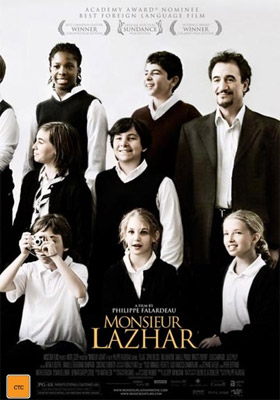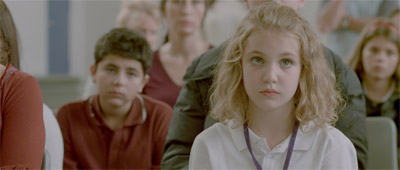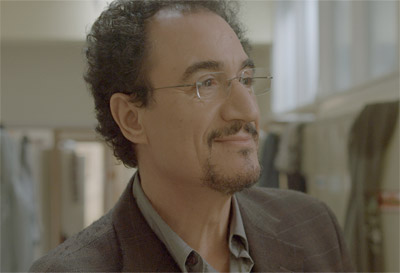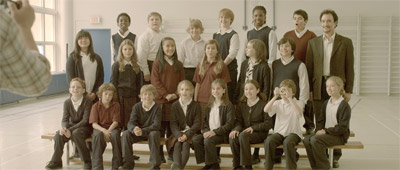Philippe Falardeau Monsieur Lazhar Interview

Philippe Falardeau Monsieur Lazhar Interview
Cast: Mohamed Fellag, Sophie Nélisse, Émilien NéronDirector: Philippe Falardeau
Genre: Comedy, Drama
Rated: PG
Running Time: 94 minutes
Synopsis: The award-winning new film from the producers of Incendies, Monsieur Lazhar is a profoundly moving story about a group of young schoolchildren coming to terms with the adult world well before their time, and the inspirational educator who transforms their lives.
The story is set in Montreal, where the beloved teacher of a Year 6 class has abruptly passed away. Having learned of the incident in the newspaper, Bachir Lazhar (Fellag), a 55 year-old Algerian immigrant, makes his way to the school and offers his services as a substitute teacher. He's in the right place at the right time, and is quickly hired to fill in.
The substantial cultural gap between Lazhar and his new class is immediately apparent, but little by little, Lazhar comes to understand this motley but endearing group, among whom are Alice (Sophie Nélisse) and Simon (Émilien Néron), two charismatic pupils particularly affected by their teacher's passing. Yet while the class begins to heal, nobody in the school is aware of Lazhar's painful past; nor do they suspect that his own place in the world is in jeopardy.
Adapting a play by Évelyne de la Chenelière, acclaimed Québécois writer-director Philippe Falardeau has crafted an indelible and universal story of compassion that earns every one of its extraordinary moments through insight, empathy and eloquence.
Release Date: September 6th, 2012
Webite: www.monsieurlazhar.com.au
Interview with Philippe Falardeau
Question: After It's Not Me, I Swear!, Monsieur Lazhar is your second film adaption of a literary work. What is it about this process that appeals to you?Philippe Falardeau: I think I like adaptations because the work has already proved itself in its initial form, either on an emotional level for me or for the general public. One thing always worries me when I make a film: will I be able to live with this subject for a period of three or four years? Will it interest others as much as it interests me? It is equally important to understand the limits of one's medium and not try and reproduce what the original medium has done successfully. For It's Not Me, I Swear!, it was clear that the humor found in Bruno Hébertís writing came from the discrepancy found in the naive narration of a 10-year-old child whose references are those of a 40 year old. For Monsieur Lazhar, Evelyne de la Chenelièreís play stages only one character. What particularly interested me was its evocative strength. I also knew it would be risky to try and emulate Evelyne's poetic style, simply because I'm not a poet like she is and film as a medium doesn't lend itself to poetry in the same way.
 Question: So it was Bachir's strength that interested you and allowed you to imagine the rest?
Question: So it was Bachir's strength that interested you and allowed you to imagine the rest? Philippe Falardeau: I liked the subject of the play and its intention straightaway. While watching, I immediately imagined the film: I saw the classroom, the children� Daniel Brièreís touching and spare direction most likely helped me to visualise a cinematic work. The character Alice existed slightly, Simon barely at all, and yet there was a whole story to invent. I knew there was room for creation. I also liked the fact that Bachir's tragic story of being an immigrant wasn't the central plot. He is confronted with something that is very concrete within the society where he has settled, but this confrontation could have occurred anywhere. The story had to be able to stand on its own merit, beyond the fact that he has gone through a traumatic event leading to his exile. It has an influence on what is going to happen: it makes him a foreigner who is going to upset our view of the world, but I still do not believe it is the subject of the film. During the play, I thought: "Here is a rich character." He's not a character that has just been invented making us wonder what could be his traits and features. Not at all. Bachir has his own backstory, his own history, even before the movie starts.
Question: How did you work with Evelyne de la Chenelière?
Philippe Falardeau: From the moment she accepted that I adapt her play, it was understood that I would be the screenwriter. I asked her to help me uphold the character's integrity and to follow me step by step. I wanted her to make sure to bring me back in line each time I headed in a direction that would betray the character's essence. She also was my first reader, along with my producers. Whenever I hit a wall, because she is an extraordinarily skillful writer, she was able to come up with real ideas. Not necessarily concrete ideas for the film, but she always knew when there was an important moment at stake and she'd send me her reflections, articles to read� and that unblocked me. That made me want to write with someone because sometimes you think you're at an impasse, but in the end there is a door - you just don't see it. Evelyne also helped me to reach emotionally deeper places for the film.
Question: It was also important for you that what Bachir was going through would be plausible.
Philippe Falardeau: I did a lot of research to get to that point. A year after having started the adaptation of the play in May 2008, I went to Algiers to see where Bachir came from to try and understand why he would have left his country. I also wanted to see what a civil servant's life would be like there� I imagined something very elaborate; that isn't in the film, but it helped me to understand him. Long before, I had also visited several countries such as Syria, Libya, Egypt and Tunisia. I have believed for a long time that this area provides a fertile ground for film subjects. When the Arab Spring arrived, for me, the timing was simultaneous with the film I had just completed. Why did Bachir come to Montreal? Because he didn't have a choice: even several years after the civil war, Algeria is still facing many problems.
 Question: But could the Bachir character have been from another country?
Question: But could the Bachir character have been from another country? Philippe Falardeau: I think so, but then perhaps the problem would be the language. I had thought about Lebanon. The character would not only have to master the French language, but also love it greatly. Because in my mind, the healing process happens through the act of speaking, teaching, loving the French language, and reading. Algeria worked well because there are many intellectuals there, great writers� Once in a Quebec school, Bachir is caught in a system that he doesn't know, and he has to search within himself to draw from what he was taught in his childhood. So his only reference is a French method of teaching that is considered old-fashioned. It shouldn't be forgotten that Bachir is a North African immigrant who is profoundly secular. This was a very conscious decision on my part. He represents the "Other," who is above all a man searching for solutions, not in religion or in morals, not even in his cultural references in the "ethnic" sense of the term, but in relation to teaching, to our common relationship with the French language and literature and then in the fundamental act of communication. There is also irony in the fact that he has come to teach in a former colony that has a particular relationship with the French language, while he also comes from a former French colony.
Question: Why did you choose Fellag for the role of Bachir?
Philippe Falardeau: I knew from the start, unless a miracle happened, that we wouldn't be able to find an actor in Quebec, because there isn't a large enough community of Maghreb actors. Given the context of the story, I was partial to France and its abundance of fine actors� I had a few people in mind, but in the end I found them too "Parisian" for the role. It was Evelyne who led me to Fellag, because he had already given a public reading of her play in France. I didn't know him before, but it made sense because he himself had been exiled during the Algerian Civil War. While he was in Tunisia, the authorities warned him not to return, as there was a fatwa against him. He has experienced what Bachir went through, and for me that death warrant gave him additional depth. Even if his one-man shows don't at all resemble the character in the film, he has a sensitivity and intelligence that greatly interested me. I liked him right away when we met. He was very familiar with the play, and after having read the screenplay, he immediately wanted the role. Fellag is enormously generous and has a great authenticity. I'm very happy with what he did, which is at the other end of the spectrum from his usual work.
Question: After It's Not Me, I Swear!, was it your intention to work with child actors again?
Philippe Falardeau: The choice was really made because of the play. The problem that occurs when children play a central role in a movie is that one always wonders if the film is for children or for the family - something that never happens when there are only adult characters. However in life, we never ask ourselves when a situation occurs if it is a child situation or an adult situation� It's just life. I think that I make films about life and that lends itself to there being children.
Question: As a screenplay writer and director, you still have to adapt your working style to the children.
Philippe Falardeau: Of course, but I think in general it is similar to the way one adapts their style for different actors. One thing that is really different is that, when it comes to an adult, I never worry if he knows his lines. Also, the set has to be managed in a more playful and relaxed manner. Yet, as far as the acting is concerned, I maintain that these children are capable of grasping the emotions at stake for their characters, that they really understand that it's a job, and that I am not asking them to be who they are in real life. It was a bit more difficult in It's Not Me, I Swear!, because the main character had a distinctive gift for repartee. This time, I tried to be less "adult" in my writing, even if the Alice character is particularly mature for her age. Obviously, there are lines that are a bit of my perspective through the words of a child. Generally speaking, there is a great deal of work done in preproduction and Félixe Ross, the acting coach who ran the children's work-shops with me, must be thanked. She understood exactly what direction I wanted to go in, and without her I would never have made it.
Question: The class and the school are shown in a very realistic manner.
Philippe Falardeau: Contrary to Evelyne, who has the ability to invent something from nothing, I need to recycle. I started my career with La Course Destination Monde (a Canadian television show where young filmmakers were invited to travel to different regions of the world and make short documentary films) and my reference point in cinema is observation. I have a strong interest in films such as those by Ken Loach or Mike Leigh, for example. Their characters are clearly drawn from reality, or at least they are anchored in something that is naturalistic, which is my preference. Before making Monsieur Lazhar, I spent several weeks in primary schools to see, for example, how a child fidgets in his seat. My art director, Emmanuel Fréchette, also conducted extraordinary research in a dozen or so schools in order to decorate ours. What is seen on the walls has been pieced together: all the artwork comes from children's work gathered in real schools. As with The Left-Hand Side Of The Fridge, which in the beginning was supposed to be a documentary, I was very happy with Monsieur Lazhar to return to a universe where I needed to document things. It's fiction, but I worked from a mixture of people I've known, I've seen or with whom I've spoken, and all of a sudden it all fleshes out. For me, film is a medium that is anchored in reality, unlike literature. I'm interested in life, especially in a film that claims to reflect a certain reality. This wasn't my main interest in It's Not Me, I Swear!, but this time it was.
Question: Is it also a film about mourning?
Philippe Falardeau: It's not a film about mourning, but rather a film about the complex organic entity that is a school. There is inevitably a healing process, but what particularly interested me was that the mourning process is taking place within the context of an encounter between an immigrant and us. And so the school is going to work through this tragedy thanks to a "free electron," a foreigner who is also going through his own mourning process. Therefore, I like to think the film is rather a response to pervading views on how to integrate immigrants. As far as I'm concerned, there isn't a "how." Let's live together with the immigrant, in everything we may experience: eat, drink, laugh, work, live� and overcome hardships together. That's what integration is; it isn't anything else. It's not a matter of establishing policies.
But there is also another dimension quite dear to me that surfaced in the film, although it wasn't in the play. It's the entire question of the codification of relationships between children and adults in schools. Over the years, we have established rules that forbid adults from touching children, no matter what the circumstances, even if it is just to "put sunscreen on their back", as the gym teacher character comments. We very well understand the reasons behind these rules and what's at stake with them. But the result is that teachers, parents and even the children walk on eggs whenever it comes to showing a certain form of affection or closeness. The question is extremely delicate and constitutes a pivotal moment in the film. I think the film speaks a great deal about this, imperceptibly at first, until the end where the subject matter becomes explicit.
 Question: During the entire film, Bachir is someone who remains strong and dignified�
Question: During the entire film, Bachir is someone who remains strong and dignified� Philippe Falardeau: Qualities that often characterise immigrants. He is discreet when it comes to himself. Bachir feels that it isn't relevant to put his emotions or his pain on display. In a world where communicating emotions is highly encouraged, he chooses to keep his to himself. And in my opinion, that is a mistake. Especially with his colleague Claire, among others. At the same time, it's what gives his character dignity: he is much more interested in helping the class work through and free themselves from their grief; so he ignores his own. But unconsciously, I think he pushes Alice and Simon because he wants to push himself. Simon is the child who carries all of the school's guilt. In the end, when Simon yields to the emotion, the tension felt by the entire school is released.
Question: Even if the film is dramatic, and the subject is serious, there are humourous elements throughout�
Philippe Falardeau: Rarely in life does tragedy or drama come alone. It's often a question of perspective. In It's Not Me, I Swear!, the humour was built on distance, an off-beat, indeed at times, absurd humour. In Monsieur Lazhar, the humour is more subtle, more down-to-earth. The Algerian character's naivety surprises us and makes us laugh. When a cultural gap is subtly played upon, there is always a rich potential for humour. The maintenance man and the gym teacher constantly have odd and direct lines that make you laugh. You must understand that, strictly speaking, there aren't any gags. It's simply that life is comical and I think we should realise it. For me, films with no humour at all are science-fiction. It just can't be!
MORE
- Mission: Impossible Fallout
- Glenn Close The Wife
- Allison Chhorn Stanley's Mouth Interview
- Benicio Del Toro Sicario: Day of the Soldado
- Dame Judi Dench Tea With The Dames
- Sandra Bullock Ocean's 8
- Chris Pratt Jurassic World: Fallen Kingdom
- Claudia Sangiorgi Dalimore and Michelle Grace...
- Rachel McAdams Disobedience Interview
- Sebastián Lelio and Alessandro Nivola...
- Perri Cummings Trench Interview



